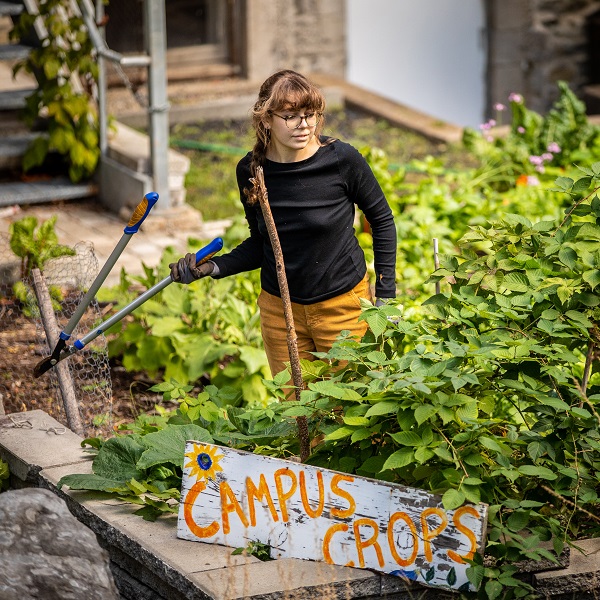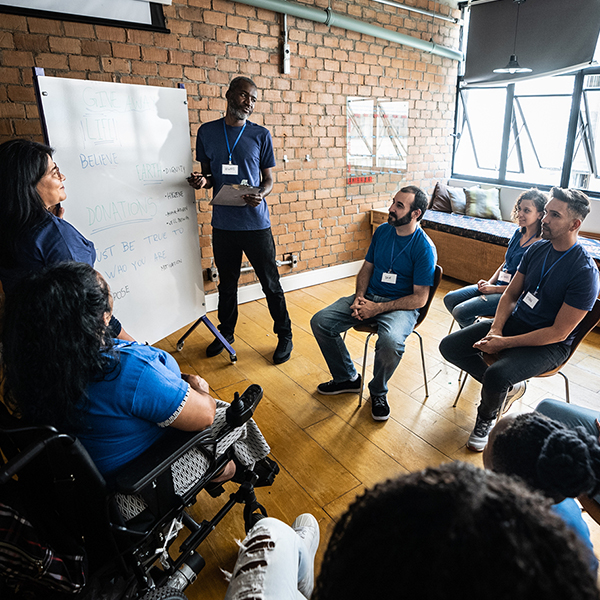Having mobility problems in a city like Montreal is no walk in the park.
Impatient drivers and cyclists, pothole-ridden roads and short pedestrian crossing signals can be tough enough for even the most able-bodied person to maneuver. Being in a wheelchair, using a cane or walker, or having a visual impairment can make crossing a busy street a major ordeal.
Two years ago, Motaz Aladas saw a news story about a person in a wheelchair who couldn’t reach the pedestrian button at stoplights and brought it up at his Ottawa dinner table with daughters Sophie and Sarah.
“I had never thought about that,” says Sarah Aladas, who is currently studying law at McGill. She says the family riffed on possible alternatives over dinner.
The next day, father Motaz — who happens to be a civil and systems engineer — came back to his daughters with an idea for a wireless approach to solving the issue: “Let’s leverage technology to fix this problem.” He developed a prototype, filed for North American patents and the tech company Key2Access was born.
Since then, Key2Access has picked up considerable steam. The startup is run from Montreal by Aladas and her sister; the two of them participated last year in the first cohort of McGill’s Lean Launchpad Startup Program, run by the McGill Dobson Centre for Entrepreneurship.
McGill’s Lean Launchpad program is a 10-week course based on the model developed at University of California – Berkeley. “It fits into the entrepreneurship ecosystem […] we’re building. Lean Launchpad is the first stage — taking people who have an early-stage idea and helping them turn them into real early-stage companies,” says Dobson Centre marketing and operations advisor Renjie Butalid.
The Aladas sisters also participated in Montreal’s InnoCité smart-city startup accelerator program. More recently, Key2Access won the MAtv/Videotron 30-second-pitch prize at July’s Startupfest (the prize entails promotional TV spots and an article in the Journal de Montréal).
The company currently makes hardware and software: An accessible smartphone app and a remote that acts as a handheld version of the pedestrian crossing button. The system also involves installing a receiver on the head of the pedestrian crossing signal that communicates wirelessly via Bluetooth with the remote and app.
“The pedestrian doesn’t have to worry about where that pole is,” Sarah Aladas says, pointing out that having the push-button in the palm of one’s hand means that a visually impaired person doesn’t have to grope around for the button and wheelchair-bound individuals don’t have to steer themselves onto a patch of grass or pile of snow to get to it. Key2Access is currently conducting a pilot project with the City of Ottawa and Aladas says the startup is negotiating with the City of Montreal on a similar project.
Key2Access is also making push-buttons that comply with recent accessibility legislation in British Columbia and Ontario. Aladas says they’re happy to work with the new push-button regulations aimed at making the lives of individuals with disabilities easier, but that the company’s portable solutions are much more economical for municipalities. She says it takes only 30 minutes to install the pedestrian-head receiver; meanwhile, cities are pulling up lampposts and traffic lights to install new push-button technology. “You’re ripping everything out, throwing it away and starting from scratch — just to solve 15 per cent of the problem,” she says.
The Key2Access app and remote have the added benefit of helping to prevent visually impaired people from veering into cars while crossing the street. The app and remote vibrate to indicate that users are on the right course. If they veer off into the wrong direction – off the crosswalk, for instance – the vibrating stops. In addition, an audio component can announce when it’s time to cross and the name of the street. Together, these functions could replace the need for the sometimes unpopular bird-chirp signals at some intersections.
Aladas says the company is also working on using its technology for door-opening buttons and for utilizing GPS and beacons to help guide people as they walk along city streets by announcing shop names, bus stops, metro stations and more.
“Accessibility shouldn’t end when you cross the street,” she says.


